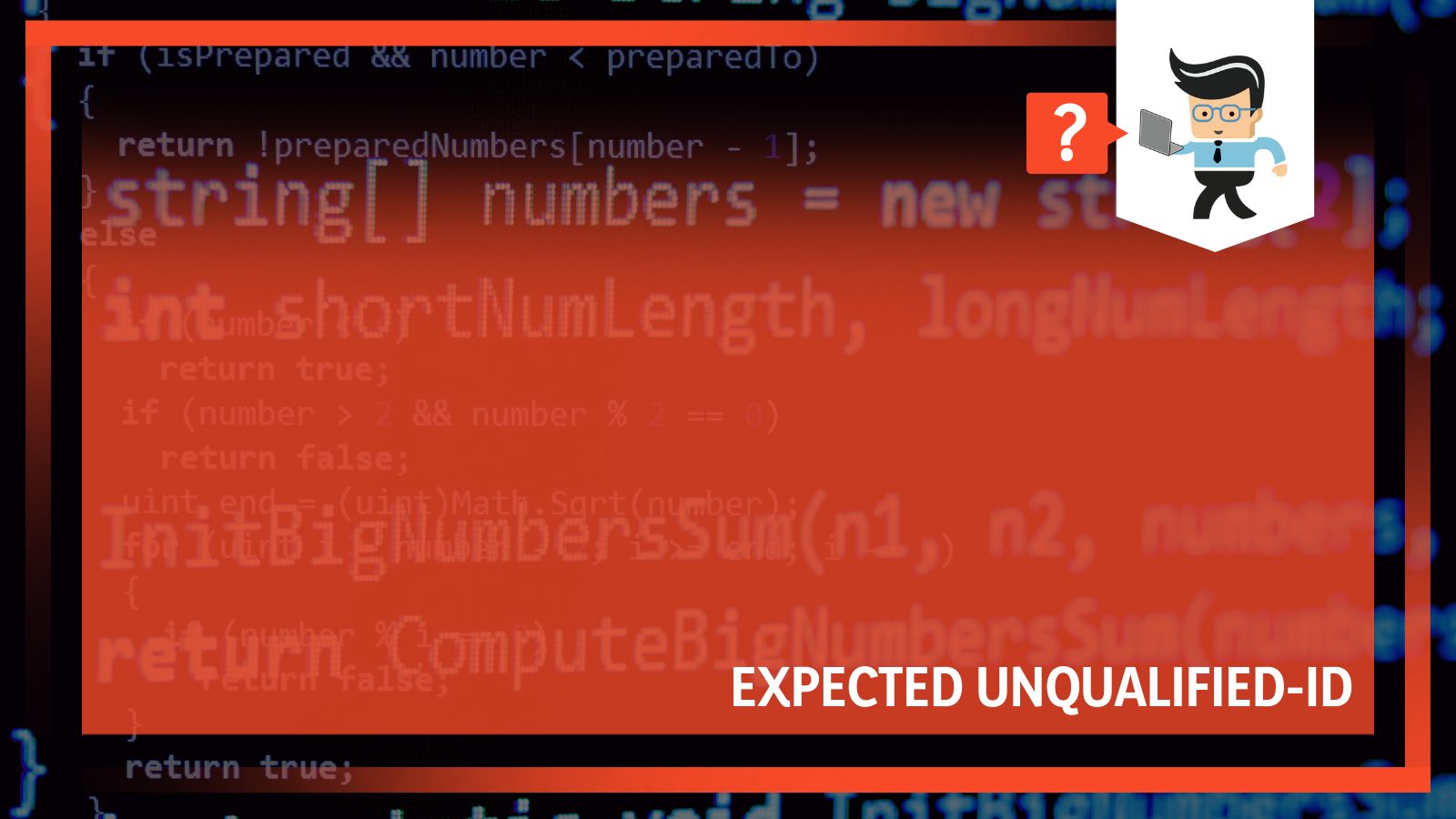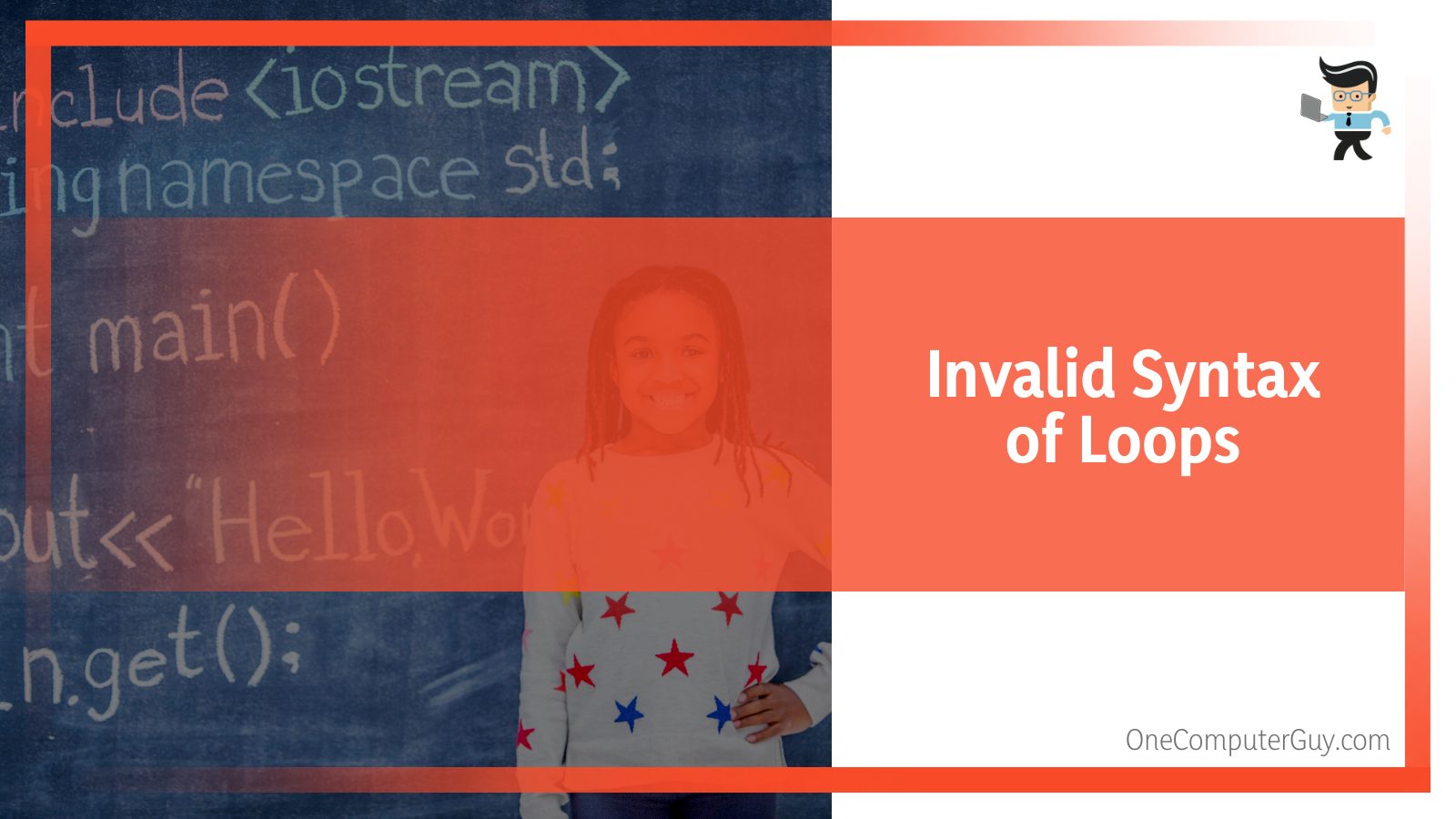Expected unqualified-id is a common error that can occur in various platforms like C/C++, Xcode, and Arduino. This article will assess why it occurs based on different scenarios involving unqualified members of code.

Furthermore, there will also be an analysis of many solutions according to those different scenarios to solve the error. This guide will serve as the ultimate help for you to understand why this error occurs and how it can be fixed.
Contents
Why Is the Expected Unqualified-ID Error Happening?
The expected unqualified-id error occurs due to several reasons depending on specific circumstances on specific platforms. The common factor in all those reasons is the inadequate role of specific members in a code concerning its implementation. It renders the members ‘unqualified’ for successful implementation and prompts the occurrence of an expected unqualified-id error.
Why Does the Expected Unqualified-ID Error Occur in C/C++ Languages?
Programming languages like C and C++ encounter this error frequently with their compilers. Simple mistakes can cause the inadequate role of members, which can hinder the implementation of the code.

Normal functioning scenarios involve qualified names of members that can refer to namespace members, class members, or enumerators. There are indications associated with these qualified names regarding where they belong.
An expected unqualified-id C or C++ involves unqualified names of members in these languages. They are not located in any namespace and do not warrant a qualification. The scope resolution operator can distinguish unqualified names as it is not used with them. The following is a list of common cases that cause the occurrence of this error in C and C++.
– Std Namespace and Scope Resolution Operator
Using namespace std expected unqualified-id error occurs when the std namespace and scope resolution operator “::” are placed in front of user-declared data names. In another case, it is not advised to use std:: when ‘using namespace std;’ is already placed at the top though it is not a problem to have both. The following is a code example that explains how these actions lead to the error:
#include <iostream>
using namespace std;
char options[] = {};
const char* random_option (options);
{
std::return_val = std::options [rand {array::size options}];
return std::return_val;
};
– Invalid Declaration of Variables
The error can also occur if the data variables are not accurately declared based on the syntax. The code example above does not state the type of its “return_val” variable.
– Invalid Placement of Semicolons
Accurate placement of semicolons is an important thing that has to be ensured which is why their invalid placement can cause the compiler to encounter the error. The code example above contains a semicolon after “random_option (options).”
This conveys to the compiler that the process of defining the function is finished now, and a function body will not be given to it afterward. It means that every member of the code inside the {} afterward is not taken as part of the function definition by the compiler.
In addition, an invalid placement of semicolons can result in the display of another error by a compiler. This error is displayed as an expected unqualified-id before ‘(‘ token) and is associated with (). It can signify that a semicolon is wrongly placed with the bracket and should be removed.
– Invalid Syntax of Loops
The error can also occur in association with the invalid syntax of loops like ‘for’ and ‘while.’ There are multiple reasons for the occurrence of the error with loops. The most common reason involves the placement of those loops outside the relevant function body.

A compiler displays the error as an expected unqualified-id before for that can mean that a ‘for’ loop is placed outside a function body. The following is a snippet of a code example that shows how the error can occur with a ‘for’ loop placed outside an ‘int main’ function:
for (i = 0; i < days; i++)
{
// loop body
}
int main()
{
…
return 0;
}
Furthermore, the error associated with a ‘while’ loop is displayed as an expected unqualified-id while by a compiler. This can mean that the while loop is placed outside a function body. Here is a code example of a snippet that shows how that can happen:
while (i = 0; i < days; i++)
{
// loop body
}
int main()
{
…
return 0;
}
– Invalid Identifier and Defining Constructors
The error can also occur while defining constructors when a compiler misreads the code as an instantiation of an object. It displays the error as an expected unqualified-id before int because now, a list of arguments is expected to be passed to the constructor. In this case, int does not qualify as a valid identifier, so it cannot be passed. The following is a snippet of a code example that shows how the error can occur:
using namespace std;
Days (int days, int month, int year)
– Why Does It Occur in Xcode and Arduino?
The error occurs in Xcode due to unqualified names of members that are not located in any namespace and do not warrant a qualification. Xcode is an integrated development environment that develops software for Apple devices only. Therefore, the expected unqualified-id Xcode error is specific to them only.
Similarly, an expected unqualified-id Arduino error also occurs due to unqualified names of members. The only difference is that this happens in Arduino, which is an open-source environment for designing microcontrollers for digital devices.
How To Fix the Unqualified-id Error?
– Std Namespace and Scope Resolution Operator
The std namespace is where all the standard library types and functions are defined. Therefore, std:: only needs to be written in front of a name if that name is defined inside of the standard library namespace. It needs to be removed from the start of those names that are declared by the user.
It is recommended to practice the conventional ways and then pick one style. You can write ‘using namespace std;’ and then avoid std:: in front of those names that are from inside of std. Or else, you can omit writing ‘using namespace std;’ at the top and then write std:: in front of all those names that are used from the standard library. The following is a snippet for the above code example in which ‘using namespace std;’ is omitted:
#include <iostream>
char options[] = {};
…
– Stating the Type of Variable
The declaration of a variable requires the user to state its type. In this way, the compiler can understand if ‘options’ in the code example above is meant to be an array of single characters or an array of strings. The following is a snippet for the above code example in which the ‘char’ type is given to the variable ‘options’:
char options[] = {};
const char* random_option (options);
– Correct Placement of Semicolons

A semicolon should not be placed after the lines of code that define a function. Those lines are followed by the relevant function body within {} that is taken as part of that function. Therefore, your code should convey this to the compiler by not having a semicolon at the end of such lines. Here is the correct snippet of the above code example for this:
const char* random_option (options)
{
std::return_val = std::options [rand {array::size options}];
return std::return_val;
};
– Checking the Syntax of Loops
The occurrence of the error in association with loops can be prevented by placing them within a function body. It does not matter if the function is ‘int main’ or any other as long as the loops are parts of the relevant function body. Here is how you can accurately place the ‘for’ and ‘while’ loops within a function body:
int main()
{
for (i = 0; i < days; i++)
{
// loop body
}
return 0;
}
int main()
{
while (i = 0; i < days; i++)
{
// loop body
}
return 0;
}
– Preventing Invalid Identifiers and Defining Constructors
The occurrence of error associated with defining constructors and involving ‘int’ can be prevented. It involves the usage of the scope resolution operator before ‘int’ so that it is not considered an invalid identifier. In this way, a constructor can be accurately defined with an acceptable involvement of ‘int’ for a compiler. Here is how you can do that:
using namespace std;
Days::Days (int days, int month, int year)
– Solving the Issue for Xcode and Arduino
The error associated with Xcode and Arduino can be solved by turning the unqualified names of members in code into qualified ones. This varies based on circumstances and primarily involves ensuring aspects of an accurate syntax. Examples of such aspects include valid placement of semicolons and declaration of variables.
Conclusion
This article sheds a spotlight on the expected unqualified-id error by covering why it occurs and how it can be fixed. Here are the important takeaway points:
- It occurs due to the inadequate role of specific members in a code concerning its implementation.
- An expected unqualified-id involves unqualified names of members that are not located in any namespace and do not warrant a qualification.
- A working code includes qualified names of members that refer to namespace members, class members, or enumerators.
- The error also occurs in Xcode and Arduino due to the same reason of unqualified names of members in a code.
- The error in these platforms can be solved by turning the unqualified names of members in code into qualified ones.
These solutions are always available for you to check which one works for you.







